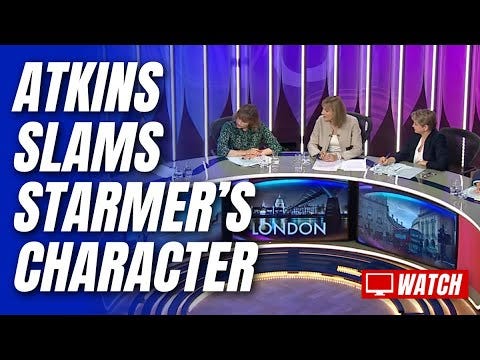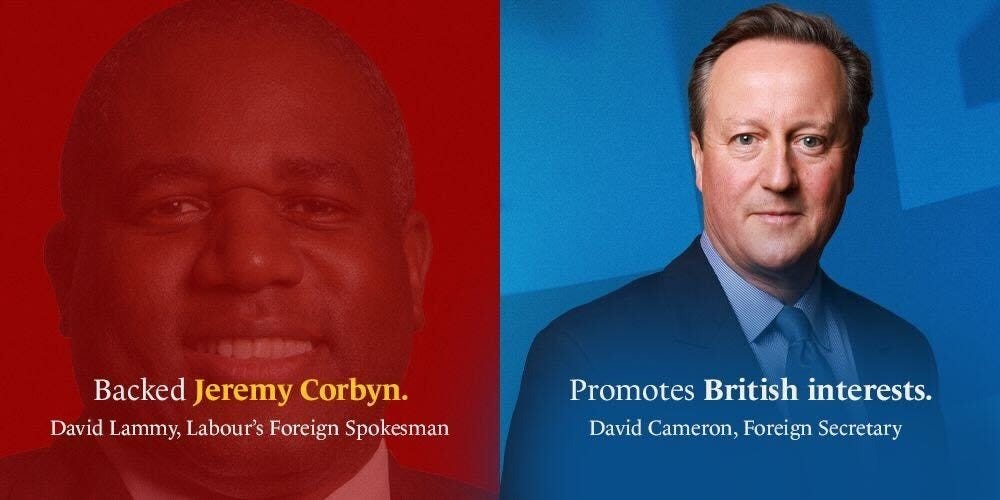On Question Time a month or so ago, then-Treasury minister Victoria Atkins made what we all now recognise as a standard Tory attack on Keir Starmer for his decision to serve in Jeremy Corbyn’s shadow cabinet, and then made a less standard, and more interesting, point, bringing up her fellow guest, Shadow Home Secretary Yvette Cooper. You can watch it here:
If you can’t be bothered to watch it (I don’t blame you, I avoid video too),1 here’s what Atkins said following her criticism of Starmer’s backing for Corbyn: “Compare and contrast, if I may say so, with Yvette, who refused to serve in his cabinet, a point of principle, she stuck with them”.
This is smart. It does three important things that are hugely in the Conservative Party’s interests. First, it makes clear that Labour MPs had a choice during the Corbyn leadership. They didn’t have to be shadow ministers if they didn’t want to. If their opposition to Corbyn was so strong that they couldn’t stomach it, they could choose to stay on the backbenches. Many did. Cooper did. Starmer didn’t. The different choices made by different Labour MPs demonstrate that serving Corbyn really was a choice - and we can all agree that people are accountable for their choices in a way that they are not accountable for things they were forced into.2
Second, it drives a wedge between different parts of Starmer’s coalition, between some of his most loyal and effective supporters in the shadow cabinet, and casts them (in Tory terms) as goodies and baddies. The goodies decided, at a cost to their own careers at least in the short term, not to back a leader and an agenda they could not in all conscience support. The baddies decided to say whatever was convenient at the time in order to get promoted - showing, as Atkins puts it, that they had no principles. Cooper has principles, this attack says. Starmer doesn’t.
And third, it involves praising at least some of your opponents. It’s nice to be nice. It makes you look reasonable. And the best thing about this sort of praise is that the recipients of it aren’t even allowed to accept it. If they take it, and agree that they did the right thing by refusing to serve under Corbyn, then they’re saying that their Leader didn’t. And they can’t say that. So they have to find another way through the praise.3
But there are downsides to this approach too. It’s the harder path. It requires a bit of subtlety. The path of least resistance is to say that all of your opponents are baddies. And a party that is used to playing on easy mode rarely takes the harder path.
Which brings us to the first act of new Conservative Party Chairman Richard Holden. Some of us are old enough to remember when he was @RicHolden, the Tory press office’s Twitter spokesman, tweeting out every press release and line to take, however silly, to the extent that he was slightly pitied inside Labour HQ for the level of personal humiliation doing all this in his own name required, before his election as Conservative MP for North West Durham in 2019 and subsequent elevation to ministerial office gave him, if not the last laugh, then certainly a more recent laugh than any of us in Labour had enjoyed for a while.4
Holden sent out an email to the Conservative Party mailing list on Monday, announcing that day’s cabinet reshuffle and soliciting donations using the graphics below.
The choice of Labour figures here looks a bit random until you realise that, Starmer aside, they’ve been chosen because they’re the shadows of the Tory ministers who’ve either entered or had major moves within the cabinet this week. That’s why Nick Thomas-Symonds is there, as the answer to a question I asked a Labour advisor after Esther McVey’s appointment on Monday: who is the Shadow Minister for Common Sense? They didn’t know. Well, now we all do.
More interesting are the captions. Not the captions on the right, although if I were Victoria Atkins or James Cleverly I might flinch at the use of the present tense in “Cuts Waiting Lists” and “Stops the Boats”. Look at the captions on the left. All the Labour figures have the same one: “Backed Jeremy Corbyn”. That’s an attack that’s different from, and much less interesting and powerful than, the one Atkins made on Question Time.5 And it cuts off what could have been a way of separating David Lammy, Wes Streeting and Yvette Cooper, among others, from Keir Starmer. Because Lammy, Streeting and Cooper all stayed off Corbyn’s front bench. They didn’t back Jeremy Corbyn, except in the narrow sense that, having been elected as Labour MPs before Corbyn’s leadership, they didn’t leave.6 For many people who supported and continue to support Corbyn, that’s a reason to be hostile to them. The attack presents Labour as united and monolithic, when the truth is more interesting and potentially, for the Tories, more fruitful.
On Thursday, following the vote on a Gaza ceasefire and the resignation of some Labour frontbenchers who broke the whip, Holden sent the same email again, with the same graphics and donation demand, along with a new message at the top and the heading “I told you so”.
It's unbelievable [name],
Labour MPs had a choice last night.
Follow Sir Keir Starmer, hide their position, and 'abstain'. Or back their former leader Jeremy Corbyn and the SNP.
Almost one third of Labour MPs chose the latter. And even worse, 10 members of Sir Keir Starmer's top team have resigned to back Jeremy Corbyn - not surprising since Sir Keir tried to make Corbyn PM — twice.
The mask has slipped [name]. Labour is, and always will be, the Party of Protest. And you can't trust them to take the long-term decisions needed to tackle the real issues facing the country.
This is the Tories’ problem, right here. This is completely incoherent. The key line is “10 members of Sir Keir Starmer's top team have resigned to back Jeremy Corbyn - not surprising since Sir Keir tried to make Corbyn PM — twice”. Why does Starmer’s previous backing for Corbyn make it not surprising that some different people have refused to back Starmer over Gaza? I can’t work out what the argument is even supposed to be.
And by the way, if you’re headlining an email “I told you so” and your first line is “It’s unbelievable”, that’s a pretty strong clue that you don’t know what your thesis is. Either it’s so predictable that you predicted it and told me so, or it’s so unbelievable that nobody could have predicted it. Not both. Come on, not both.
There’s more to political attack - there should be more to political attack - than relentless unsubtle negativity, because relentless unsubtle negativity soon trips up over its own contradictions, its need to say that its opponents are bad before thinking about why its opponents are bad, and about whether there are degrees of opposition badness, and examples of opposition goodness, that make the overall argument more convincing. Victoria Atkins’ praise for Yvette Cooper at Keir Starmer’s expense is an example of a level of subtlety that ought not to be beyond more Tories. Fortunately for Labour, it looks like it is.
Thanks to everyone who has subscribed to this newsletter and to everyone who has shared or recommended it - special thanks to Helen Lewis and Jonn Elledge and John Oxley and James O’Malley, all of whom have excellent newsletters to which you should also subscribe, and all of whom have used their excellent newsletters to recommend Dividing Lines.
Lots of footnotes in this one, aren’t there? I hope that doesn’t make the whole thing too annoying to read. Some of the best material is in the footnotes.7
I also avoid Question Time. For several years it was an important part of my life because I had to brief Labour spokespeople who went on it, and then watch it, every week. It was one of the things I enjoyed most about my job, apart from the “watching Question Time” bit. But it’s not part of my job any more, and I haven’t seen it for years.
It is fair to say that it is not only Labour politicians who have made poor choices about which leaders to serve in recent years, and not only Labour politicians who are accountable for the consequences of those choices.
By the way, I’m well aware that it doesn’t go without saying that serving in Jeremy Corbyn’s shadow cabinet and backing him to be prime minister was bad. Plenty of people thought at the time, and think now, that it was the right thing to do, and that Corbyn’s Labour was better than Starmer’s - even if the polls suggest that this is a minority view. But this post is about a Tory attack and the current Labour response to it. The attack is premised on the idea that Corbyn was not fit to be prime minister, and Labour’s current position is that this analysis is basically correct: the party had to change, and it has. You can’t make this argument while making a wholehearted defence of Starmer’s previous position, and so nobody does - which leaves a gap for the Tories to poke at.
I’m expecting Holden to be an improvement on Greg Hands, and while honestly this is damning him with faint praise, to be fair to him he will know his way around CCHQ having worked there for as long as he did. You might even say he is CCHQ.
Incidentally, when I first saw Holden’s email and had the idea for this post, I wanted to say that these graphics represented a step back from an established Tory line of trying to put a wedge between Starmer and the more consistently anti-Corbyn members of the shadow cabinet. But after quite a lot of internet searching I’m pretty sure this was wrong - Atkins on Question Time aside, they’ve hardly ever done it. They’re always a bit crapper than I think they are, these people.
There’s a variant of this thrown at Labour MPs in this position, which is that they “tried to make Jeremy Corbyn Prime Minister”. Well, not really. They tried to keep their seats, which were Labour before Corbyn and are still Labour now (unlike the seats of a lot of former Labour MPs following the 2019 general election, you might notice). The interesting thing about the Tories’ “they tried to make Jeremy Corbyn Prime Minister” is how different it is from a widely-held line on and around the left of the Labour Party: that attempting to fight a defensive general election campaign in 2017 and 2019, trying to hold as many Labour seats as possible on the assumption that Labour would lose and the only question was how badly, is evidence of active disloyalty to the Corbyn project. The Tories think that having been a Labour MP during that period is prima facie evidence of having tried to make Jeremy Corbyn Prime Minister. Jeremy Corbyn doesn’t, and whatever you think of him he has the scars on his back to prove it.
Although not this one.









This is very good
The question in my mind is would Corbyn really have been worse than Johnson+Truss? I wonder?